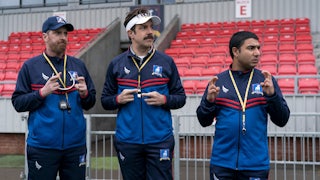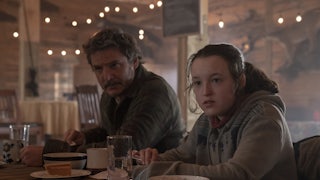Even for haters, it’s hard to deny that the pitch for Apple TV+’s Ted Lasso is a pretty audacious play. The fish-out-of-water show follows the titular Ted Lasso, an affable caricature of an aggressively optimistic Midwestern college football coach, as he accepts a job to coach a struggling Premier League soccer team in London. It’s not necessarily meant as a dig to say that the premise of this show could plausibly also describe a Super Bowl beer commercial or a cut-for-time Saturday Night Live sketch. Jason Sudeikis, in fact, developed the character for a series of promo spots that ran alongside NBC Sports’ stateside coverage of the actual Premier League.
By and large, the show’s 2020 pilot episode ran with the bit. Ted ambles his way through a series of comical culture-clash scenarios—They have different words for things over here! Soccer is played in halves, not quarters! Tea tastes bad!—the players are skeptical, and, eventually, the team owner reveals that Lasso’s hiring is all part of her sinister plan to destroy the club. It gets set up less as a traditional sports show than a workplace sitcom, with beats that echo everything from The Mary Tyler Moore Show to co-creator Bill Lawrence’s own hit Scrubs.
Then something genuinely bizarre happened. In a long scene, composed mostly of tight close-ups on Sudeikis’s face, Ted has a phone call with his wife and son, who’ve stayed behind in Kansas. We learn, through Sudeikis’s stammering half of the conversation, that Ted’s taken the job as a last-ditch effort to save his marriage, a spectacularly excessive gesture intended to give his estranged wife “space.” We see him tell her that he loves her, and we see him heartbreakingly reassure her that it’s OK if she doesn’t say it back. More than the over-the-top inspirational catchphrases, the nesting puns, or all the found-family coziness, it’s this shift that sets the tone for Ted Lasso.
For as earnest as Ted Lasso is, as sentimental and sincere and sometimes corny as it can be, it is ultimately a show that is about its own improbability. Every season of this show, especially the third and (potentially) final season, premiering this week, has been thematically structured around the unsustainability of its own premise, the sheer madcap unlikeliness of its conceit. How can a football coach somehow become a football coach? How can a show be both a full-fledged high-joke-volume sitcom and a relatively dark melodrama about depression, divorce, abandonment, and suicide? Because of the show’s famously meta aesthetic—its constant referentiality, the woven cloak of pop culture nods and quotations that enshrouds everything we see, its frequent formal gimmickry—this theme often becomes text rather than subtext. “I wonder what the heck I’m still doing here,” Ted asks, out loud, to multiple people in the first episode of the new season. What indeed?
This meta-structure can be refreshing and fun, a way for the show to take advantage of the kind of attention we’ve learned to pay to Easter eggs and puzzle boxes and redirect it toward a kind of running commentary on the show’s beats and arcs and twists. But all this self-referentiality can also make the show unmoored from any stable grounding. A show this aware of itself can be wise, but it can also be nervous or, worse, detached. What is Ted Lasso still doing here?
It’s a trope of certain twenty-first-century serial dramas that, at some level, they are about themselves as television shows. The Sopranos is a family melodrama about a gangster approaching middle age in the decline of the American empire. And in its famous psychiatrist’s office scenes, Tony Soprano and Dr. Melfi talk about the cultural myths that both Tony and David Chase have drawn upon to produce this character; Dr. Melfi asks the questions a fan might ask, or a critic. Mad Men too is a high-concept piece of narrative art for television about people trying to make high-concept pieces of narrative art for television.
Ted Lasso doesn’t approach the heights of either of those series, but it is just as much about itself as they are. Characters frequently announce their own motivations or describe themselves in terms of their character archetypes. The characters don’t break the fourth wall, but they all tacitly acknowledge that wall’s existence. Sometimes the show does this brilliantly, as it did in season 2’s romantic comedy pastiche episode, “Rainbow,” which was structured as a classical rom-com plot but also featured multiple characters quoting and discussing their favorite rom-com films. It was an elegant, even affecting, marriage of the show’s sensibilities and modes of address that made an otherwise loose and baggy second season start to feel purposeful and even passionate. But the show also does this in a cloying and thudding way, as in “Beard After Hours,” an episode-length homage to Martin Scorsese’s After Hours, and genuinely one of the worst episodes of TV I think I’ve ever seen. Its totalizing winkiness bloated the episode, each moment a dutiful gimmick rather than a clever, self-conscious pretzel bite.
In this, Ted Lasso can also begin to feel like other meta-comedies like 30 Rock or especially Community. The difference, though, is that the episodic nature of those series allowed them to embrace the chaos of a world warped and whorled by self-reference and postmodern pyrotechnics. Whereas Community could reset its pieces and restabilize itself after episode-length conceptual stunts like “Critical Film Studies” and “Remedial Chaos Theory,” Ted Lasso has to take its own narrative acrobatics in stride, integrating everything back into an ongoing storyworld that is, ultimately, rooted in some vision of “real life” stakes. For as much as this show occupies the “comfort food” genre of streaming sitcom, its shape-shifting style can make for an intermittently uncomfortable watch.
This worked very well in the charmingly off-kilter first season, when Coach Lasso’s narrative obstacle was winning over a series of gruff antagonists, from the British sports media to the resistant players to the owner-saboteur. We tracked the progress of Ted’s evangelical mission by the characters who began to talk like him. Ted’s optimism began to infect everyone around him—first easy targets like the blunt and bubbly Keeley (Juno Temple), then hard marks like Roy Kent (Brett Goldstein), and eventually the bitter and steely Rebecca (Hannah Waddingham) herself—and we knew that because they adopted his busy, byzantine, self-referential patter. Like the mushroom zombies in The Last of Us, Ted transformed everyone he met into a single organism, aware of itself as one. The Lasso of Us.
But, with that goal accomplished, all skeptics converted, everyone a little Lasso, where was there to go? This question, unsurprisingly, is one asked and answered on-screen by Ted himself. In the first season finale, Ted laid out a three-season plan for AFC Richmond that also sounds a lot like a three-season plan for Ted Lasso. The team’s just been relegated after a brutal loss, but owner Rebecca surprises Ted by refusing to fire him. So Ted sits on the couch in her office and asks if teams that are relegated can be un-relegated. Rebecca replies that yes, indeed, they can get promoted. So Ted—credulously, incredulously, who knows—says, “So then, next year, we get ourselves a promotion, which looks good on any résumé. Then we come back to this league and … we do something no one believes we could ever do. Win the whole fucking thing.” Season 1: relegation. Season 2: promotion. Season 3: win.
As if that weren’t direct enough, the third season begins with a newly frustrated Rebecca reminding Ted of that speech. Ted remembers, but he’s at a loss: unsure if, after motivating his team (and himself) to pull themselves out of the doldrums in the uneven season 2, he can take them to the promised land in season 3. His ambivalence about this last part—the aforementioned winning of the whole fucking thing—is a recurring theme of the new season. And true to form, the show mirrors Ted’s ambivalence, half-heartedly throwing ideas against the wall. The team signs new players to give their championship push new life, for instance, and so, not unrelatedly, the show brings in new actors to enlarge the world and give it new dynamism. It gives old characters new side hustles and thereby fractures its central workplace into three (possibly four?) separate workplaces. It has Ted variously consider if the solution to his malaise is reconciling with an old friend, pursuing a new love interest, or even dredging up more ghosts from his past. But nothing, it turns out, is exactly right.
Alongside these renovations, the show has also begun poking—conspicuously—at the limits of its premise: Ted’s lack of knowledge about the sport, the extreme distance he’s unnecessarily created between himself and his beloved son, the dwindling patience all these little Lasso converts have with Ted’s inadvertent mockery of everything they care about. These were always the problems of the premise, the things about which we’ve all willingly suspended our disbelief. But now the show is asking us, as Ted’s sign says, to start believing. How, genuinely, does all of this work? Ted’s won everybody over, but so what? Now what?
This gambit is a great example of the way Ted Lasso’s writers can tend to
both underthink and overthink their show. Having Ted explicitly acknowledge that his whole deal is getting a little tired, that the show’s concept might be running out of steam, that its narrative may well have been stagnant for a season or more—this is all very clever, but it’s also pretty maddening. If Ted’s questioning what he’s doing at AFC Richmond, and the show itself is questioning what it was thinking in putting him there in the first place, might we start to question what we’re still doing watching the show? Is simply acknowledging the problem enough? What’s the plan of attack? What’s the trick play? How do you solve a problem like Ted Lasso? Maybe you don’t.






